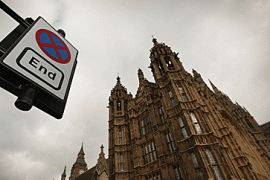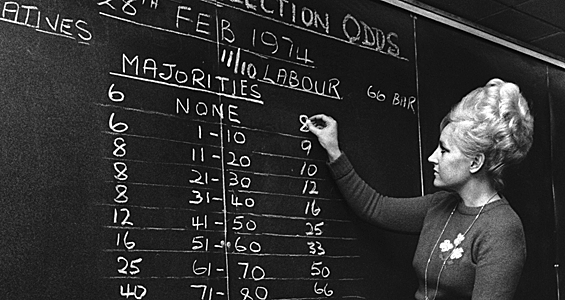What does a hung parliament mean?
What happens now the UK election has ended without a clear winner?

 |
| The last time Britain saw a hung parliament was in 1974 [GALLO/GETTY] |
The phrase “hung parliament” has seldom been used in British politics. It doesn’t happen very often.
It’s common enough in countries with proportional representation voting systems, like Germany or Italy.
But the last time Britain saw a hung parliament was in 1974 – 36 years ago. Before that, the only hung parliament was after the election of 1929.
Outright winner
A hung parliament arises when no single political party has enough members in the House of Commons to push through legislation – so power hangs in the balance.
The reason it doesn’t happen often in Britain is simple: the first-past-the-post voting system usually leads one party to emerge as an outright winner over the others.
| special report |
 |
Britain has 650 voting regions – or constituencies – and at election time each “returns” a member of parliament with a seat in the House of Commons.
In theory at least, one party could win each and every seat. The winning party does not even need half the popular vote to do it.
Of course that hasn’t happened, but it is normal for one single party to win at least half the seats in parliament, allowing it to govern alone.
For the last 13 years that party has been Labour, first under Tony Blair, and then under Gordon Brown.
Political alliances
So, what happens now?
Well, Brown will remain as caretaker prime minister and, as tradition dictates, he will be able to have the first shot at forming a government .
But he will have to form alliances with other parties, by offering policy concessions and, possibly, senior cabinet jobs, in order to avoid defeat in the House of Commons.
But Britain’s third largest party, the Liberal Democrats, has said that the opposition Conservatives, who won the most seats in parliament have the moral authority to have the first tilt at forging a coalition.
This seems to leave Brown with little chance of getting the support he needs.
If he attempts and fails to form a coalition, David Cameron, the Conservative leader, could be asked to try his luck in enticing the smaller parties or could head a minority government.
If he were to form a minority government, Cameron would rely on the smaller parties for their votes to get legislation passed.
Adversarial system
Britain’s parliamentary system is by its very nature adversarial with MPs voting along party lines.
The “big two” rarely offer one another real support except in international affairs, and then often grudgingly.
For years, voters have been asking whether that is the best way of running a country.
Reformists favour more consensus, they want a government which makes decisions without slavishly following party interests. Under a hung parliament that could be an outside possibility.
One thing is for sure – without multi-party deals under a hung parliament the government will be dissolved and a fresh election called.